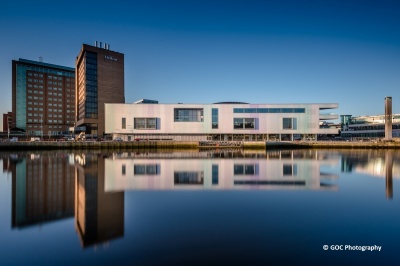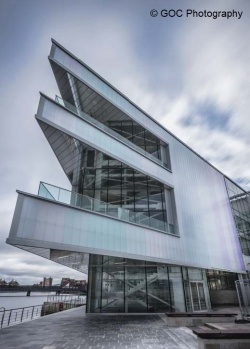Difference between revisions of "Belfast Waterfront Conference & Exhibition Centre"
| Line 37: | Line 37: | ||
New conference halls, banqueting and break-out spaces extend the Belfast Waterfront Conference Centre right up to the quay of the River Lagan. The resulting multiple challenges, both physical and financial, were met by a sequence of appropriate and pragmatic structural steel and architectural solutions. | New conference halls, banqueting and break-out spaces extend the Belfast Waterfront Conference Centre right up to the quay of the River Lagan. The resulting multiple challenges, both physical and financial, were met by a sequence of appropriate and pragmatic structural steel and architectural solutions. | ||
| − | [[Category:Case studies | + | [[Category:Case studies - Leisure buildings]] |
[[Category:SSDA]] | [[Category:SSDA]] | ||
Latest revision as of 12:39, 12 March 2019
Structural Steel Design Awards 2018 - Commendation
The new steel-framed extension to the Belfast Waterfront stretches from the existing building out to the edge of the River Lagan and provides an additional 7,000m2 of floor space which can facilitate up to 5000 guests at any one time. There is an 1800m2 main hall and a 700m2 minor hall, each of which can be sub-divided to allow flexible layouts. These large clear span spaces were most cost-effectively achieved with a steel frame.
The facility has been designed to fit in with its surroundings, wrapping around the existing building and connecting to the existing facilities at multiple levels, though remaining an independent structure. The extension spans over the existing services yard and service building on the riverside. Public access to the river has been maintained. The congested location proved challenging, being extremely restricted in terms of access and by surrounding structures and its proximity to the river.
The use of steel meant the construction works could be accelerated given the opportunity to prefabricate the frame offsite in advance.
The complex primary structure was influenced by several factors. The spatial requirements for the extension involved column-free spaces, a combination of single and double-height spaces and partial intermediate floors, and the need to build over and around retained structure. This led to several framing solutions being employed, using 1400 tonnes of steel.
Pre-cambered cellular beams were used along with metal deck composite concrete flooring. The degree of pre-cambering was calculated to provide level steelwork after dead load deflection.
Extra levels were squeezed in as the building’s footprint gave very limited floor space. To give this intermediate floor sufficient ceiling height ‘Slimflor’ construction was adopted, using plated UC sections within the floor depth.
‘Cellform’ beams were used to form the main hall roof; this allowed services to pass through the beams and thus maximise ceiling heights. These ‘cellform’ beams had a tapered section to provide integral roof falls (and provide a level soffit for rigging steelwork).
For the accommodation built over the service yard, cantilevered plate girders were used as their supporting columns were offset to maintain clear height for HGV access.
This project was Belfast City’s Council’s first use of BIM on a major project. It was delivered using advanced modelling techniques, which minimised on-site clashes and maximised the efficiency of design and construction.
Further details of the design and construction of this project are available here.
| Architect | Todd Architects |
| Structural Engineer | Doran Consulting Ltd |
| Steelwork Contractor | Walter Watson Ltd |
| Main Contractor | McLaughlin & Harvey Ltd |
| Client | Belfast City Council |
Judges' comment
New conference halls, banqueting and break-out spaces extend the Belfast Waterfront Conference Centre right up to the quay of the River Lagan. The resulting multiple challenges, both physical and financial, were met by a sequence of appropriate and pragmatic structural steel and architectural solutions.





